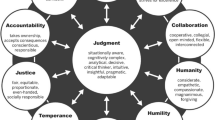Abstract
This chapter assesses gender differences in leader evaluations in the 2005 British General Election. The research presented here is part of a larger project that considers issues, leaders and the motivators of voting behaviour more generally (Campbell and Winters, 2006). There is a received wisdom amongst the media and political campaigners that women’s assessments of political leaders are more driven by emotion and personality than men’s are. Here we describe the attempts parties made to target men and women’s votes, how this campaigning was reported in the media and whether in fact there was any difference in the way men and women evaluated party leaders.
Access this chapter
Tax calculation will be finalised at checkout
Purchases are for personal use only
Preview
Unable to display preview. Download preview PDF.
Similar content being viewed by others
Bibliography
Bartle, J. 2005. ‘Homogenous Models and Heterogeneous Voters’. Political Studies, 53 (4), pp. 653–75.
Campbell, A., Converse P.E., Miller, W.E. and Stokes, D.E. 1960. The American Voter. New York: John Wiley.
Campbell, A., Gurin, G. and Miller, W. E. (1954) The Voter Decides. Evanston, IL: Row, Peterson & Co.
Campbell, R. 2004. ‘Gender, Ideology and Issue Preference: Is There Such a Thing as a Political Women’s Interest in Britain? British Journal of Politics and International Relations,. 6 (1), pp. 20–44.
Campbell, R. and Lovenduski, J. 2005. ‘Winning Women’s Votes?: The Incremental Track to Equality’, Parliamentary Affairs, 58 (4), pp. 837–53.
Campbell, P. and Winters, P. (2006): ‘The 2005 British General Election’, in Campbell, R. (ed.), Gender and the Vote in Britain. Colchester: ECPR Press.
Childs, S., 2005. Feminizing British Politics: Sex and Gender in the 2005 General Election. In A. Geddes and Tonge, J. (eds), Britain Decides The UK General Election 2005. London: Palgrave Macmillan.
Childs, S. 2007. Women in British Politics. London: Routledge.
Clarke, H., Sanders D., Stewart, M. and Whiteley, P. 2004. Political Choice in Britain. Oxford: Oxford University Press.
Foley, M. 2000. The British Presidency. Manchester: Manchester University Press.
Jacquette, J. (ed.) 1974. Women in Politics. New York: Wiley.
Johns, R. and Shephard, M. ‘Gender, Image and Electoral Preference’, Working Paper, Department of Government, University of Strathclyde.
King, A. 2002. ‘Do Leaders’ Personalities Really Matter?’ In A. King (ed.), Leaders’ Personalities and the Outcomes of Democratic Elections. Oxford: Oxford University Press.
Miller, A. 1986. ‘Schematic assessments of presidential candidates’. American Political Science Review 80 (2), pp. 521–40.
Miller, W.E. and Shanks, M.J. 1996. ‘Evaluations of the Candidates’ Personal Qualities’, The New American Voter. Cambridge: Harvard University Press
Mughan, A. 1993. ‘Party Leaders and Presidentialism in the 1992 Election: A Post-War Perspective’. In Denver, D. et al. (eds), British Elections and Parties Yearbook 1992. London: Frank Cass.
Rhan, W. M., Aldrich, J. H., Sullivan J. L. and Borgida E. 1990. ‘A Socio-Cognitive Model of Political Candidate Appraisal.’ In Ferejohn, J. and Lukinshi, J. (eds), Information and Democratic Processes. Urbana, Ill: University of Illinois Press.
Shabad, G. and Anderson, K. 1979. ‘Candidate Evaluations by Men and Women’. Public Opinion Quarterly, 43 (1), pp. 18–35.
Editor information
Editors and Affiliations
Copyright information
© 2007 Kristi Winters and Rosie Campbell
About this chapter
Cite this chapter
Winters, K., Campbell, R. (2007). Hearts or Minds?: Leader Evaluations by Men and Women in the General Election. In: Wring, D., Green, J., Mortimore, R., Atkinson, S. (eds) Political Communications. Palgrave Macmillan, London. https://doi.org/10.1057/9780230286306_17
Download citation
DOI: https://doi.org/10.1057/9780230286306_17
Publisher Name: Palgrave Macmillan, London
Print ISBN: 978-1-349-27973-9
Online ISBN: 978-0-230-28630-6
eBook Packages: Palgrave Political & Intern. Studies CollectionPolitical Science and International Studies (R0)



